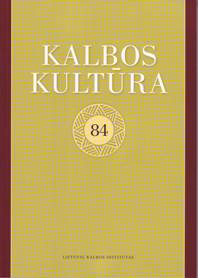Kalbos taisyklingumas Latvijoje ir naujas požiūris į preskriptyvizmo teoriją
Language correctness and a new perception of the theory of prescriptivism in Latvia
Author(s): Dace Strelēvica-OšiņaSubject(s): Sociolinguistics, Baltic Languages
Published by: Lietuvių Kalbos Institutas
Keywords: linguistic prescriptivism; linguistic dominance; sociolinguistics; language errors;
Summary/Abstract: This article summarizes (and elaborates further) some of my previous research on the issues of language accuracy and the manifestations of linguistic prescriptivism in Latvia. Unlike the Anglophone world, where prescriptivism has been recognized, named and criticized (as unscientific and socially intolerant and non-democratic) for almost a century, in Latvian culture it has been only about ten years that prescriptive attitudes have attracted the attention of sociolinguists, and, moreover, have been attributed the term “prescriptivism”. However, the pursuit of language accuracy has always been rather intense in Latvia (and usually associated with national identity issues).My research has led me to new insights in the theory of prescriptivism (most of them can be found in my doctoral thesis of 2010 and the book subsequently published in 2011). I have offered a new classification of prescriptivism, which includes three main types:1) Human-oriented prescriptivism is a type of prescriptivism known (and criticised) in Anglophone culture, where language correctness is historically related to a person’s social ‘correctness’ and people have tried to improve their linguistic performance in order to assert or secure their place in the social hierarchy. Antiprescriptivists, drawing on this experience, see linguistic prescriptivism as mainly based on outdated perceptions of social prestige and power.2) Language-oriented prescriptivism is a type of prescriptivism which attempts to ‘save’ language from alleged degradation, especially if caused by the influence of other languages. It is characteristic of communities which have been dominated by allophone ethnic groups (but have nevertheless successfully retained their language and still use it in all sociolinguistic functions), such as the Latvian community with the historical experience of German and Russian political and linguistic dominance. These communities have often regarded the protection of their language and its correctness and ‘purity’ as a symbol of and inspiration fornational self-confidence and political protest. This kind of prescriptivism and purism has sometimes been credited with xenophobia and ethnic intolerance. However, as the evidence suggests, linguistic communities that attribute great importance to language as the basis of national identity, and to language issues in general (including prescriptive and purist care about language correctness), are able to maintain the ethnic controversies within the sphere of language and to avoid physical aggression.3) Error-oriented prescriptivism is a type of prescriptivism which can coexist in parallel with either of the first two types. It is a tendency to stigmatize and eliminate certain ‘popular’ (often encountered and/or criticized), real or imagined language errors. This type of prescriptivism can be observed in many cultures and is sometimes seen by the recipients of the critique as the prescriptivists’ desire to psychologically humiliate other people.The present article discusses some other aspects of prescriptivism and language correctness as well, such as challenging the popular view in Anglophone linguistics that all forms uttered by native speakers are by definition correct. While this may be true for the English language (where, for the last millennium, there has been no considerable impact on its grammar by the dominating presence of a foreign language), we should probably not assume that in any other linguistic community a form or construction used ungrammatically by non-native speakers and repeated likewise by one or more native speakers automatically becomes correct.
Journal: Bendrinė kalba (iki 2014 metų – Kalbos kultūra)
- Issue Year: 2011
- Issue No: 84
- Page Range: 259-276
- Page Count: 18
- Language: Lithuanian

